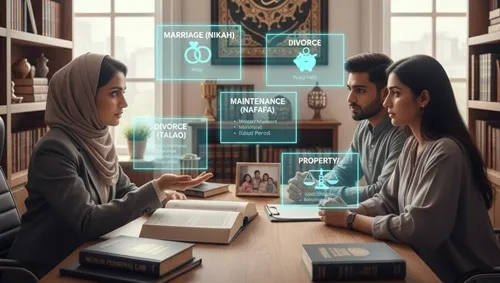Muslim Family Laws – Marriage, Divorce, Maintenance & Property

Indian Muslims are governed by Islamic personal law in family matters. Three key Acts are applied:
- Muslim Personal Law (Shariat) Application Act, 1937 – Governs marriage, inheritance, guardianship, gifts, and wills.
- Dissolution of Muslim Marriages Act, 1939 (DMMA) – Protects women's rights to divorce under specified conditions.
- Muslim Women (Protection of Rights on Divorce) Act, 1986 – Ensures maintenance and financial support to divorced women.
Key Highlights
- Scope: Personal and family matters only; criminal matters are outside these Acts.
- Marriage: Nikah is recognised; registration is optional under state laws.
- Divorce: Both husband and wife have rights; DMMA gives Muslim women grounds for divorce.
- Maintenance: 1986 Act ensures post-divorce financial security.
- Inheritance: Shariat governs shares, usually favouring male heirs more than females, but legally binding.
- Guardianship & Wills: Guardianship allowed for minors; up to 1/3 of property can be willed by the owner.
- Polygamy: Muslim men can marry up to four wives under conditions; women cannot.
️ State-Level Practical Guidance
| State/UT | Marriage Registration | Divorce/Maintenance | Inheritance/Property | Local Resource |
|---|---|---|---|---|
| Uttar Pradesh | Optional Nikah registration | DMMA cases filed in Family Courts | Shariat applies | UP Family Courts |
| Maharashtra | Registration encouraged | 1986 Act for maintenance | Wakf Board & Shariat rules | Mumbai Family Court |
| Kerala | Optional, state facilitates record | Women's claims via DMMA | Inheritance via Shariat | Kerala Family Courts |
| Karnataka | Optional | Maintenance via 1986 Act | Guardianship & inheritance via Shariat | Bangalore Family Courts |
| West Bengal | Marriage registration optional | DMMA cases in Family Courts | Shariat applies | Kolkata Family Courts |
| Telangana | Optional, encouraged for proof | Maintenance under 1986 Act | Wakf Board for property disputes | Hyderabad Family Courts |
| Tamil Nadu | Nikah registration optional | DMMA enforcement | Shariat inheritance | TN Family Courts |
| Rajasthan | Optional | Divorce/maintenance via courts | Shariat governs property | Rajasthan Family Courts |
Practical Tips
- Keep the Nikah Nama and witnesses' IDs safely; it helps in disputes.
- File for maintenance immediately after divorce under the 1986 Act.
- Consult Family Court or Wakf Board for property issues.
- Guardianship and wills should be in writing and preferably registered.
- NRIs can file cases in India through Power of Attorney (PoA).
FAQs – Muslim Family Law
-
1. Who do these laws apply to?
-
Indian Muslims (Sunni & Shia), unless specifically exempted for Scheduled Tribes.
-
2. Can a Muslim woman get a divorce?
-
Yes, under DMMA, women can file for:
- Husband's absence or failure to maintain
- Cruelty
- Imprisonment of husband
- Failure to perform marital obligations
-
3. What maintenance is a divorced woman entitled to?
-
Under the 1986 Act, she receives reasonable and fair maintenance beyond the iddat period, including housing or a monthly allowance.
-
4. Can Muslim women inherit property?
-
Yes, under Shariat; shares are defined in the Quran.
-
5. Can men marry multiple wives?
-
Yes, up to four, provided conditions under Shariat are met.
-
6. Can adoption be done under Muslim law?
-
Traditional adoption isn't recognised; only guardianship is practised.
-
7. Are live-in relationships recognised?
-
No, they are not addressed under Islamic law.
-
8. What if a husband refuses maintenance after divorce?
-
The divorced woman can approach the Court or Executive Magistrate for enforcement.
-
9. Can a woman seek annulment or declaration of marriage invalidity?
-
Yes, in cases like underage marriage, coercion, or non-fulfilment of marriage conditions.
-
10. Can wills be made?
-
Yes, but up to 1/3 of the property; the rest goes to legal heirs.
-
11. Does the Uniform Civil Code affect these laws?
-
Yes, if UCC is implemented, these personal laws could be replaced.
-
12. Is registration of marriage mandatory?
-
No, Nikah is valid under Shariat; registration is optional but recommended for proof.
-
13. Can a divorced woman remarry?
-
Yes, after completing her iddat period.
-
14. Can disputes be challenged in court?
-
Yes, courts uphold Shariat, but implementation can be contested.
-
15. Are all states applying these laws uniformly?
-
Yes, the Acts are national, but enforcement and procedure vary by state.
Add new comment